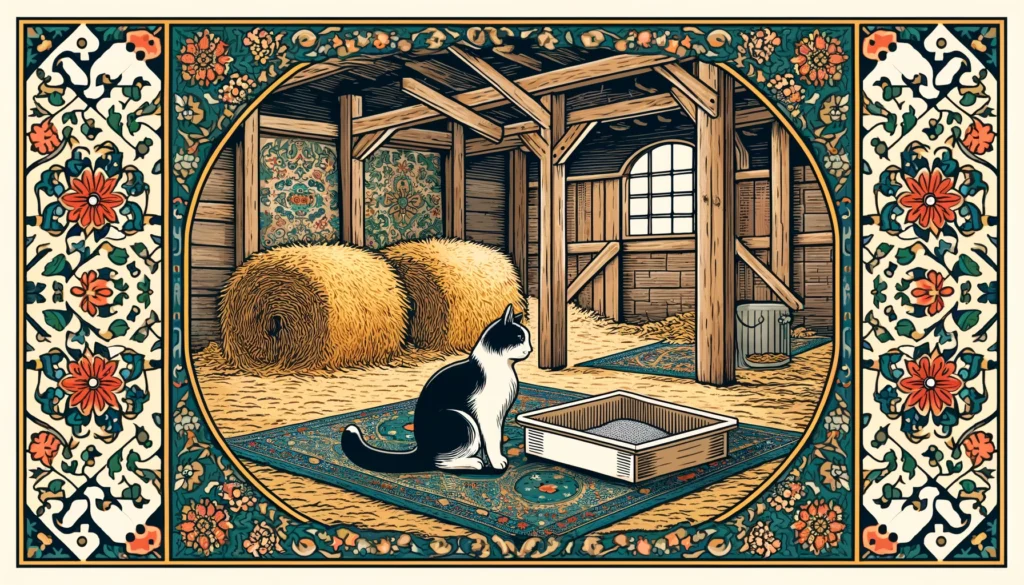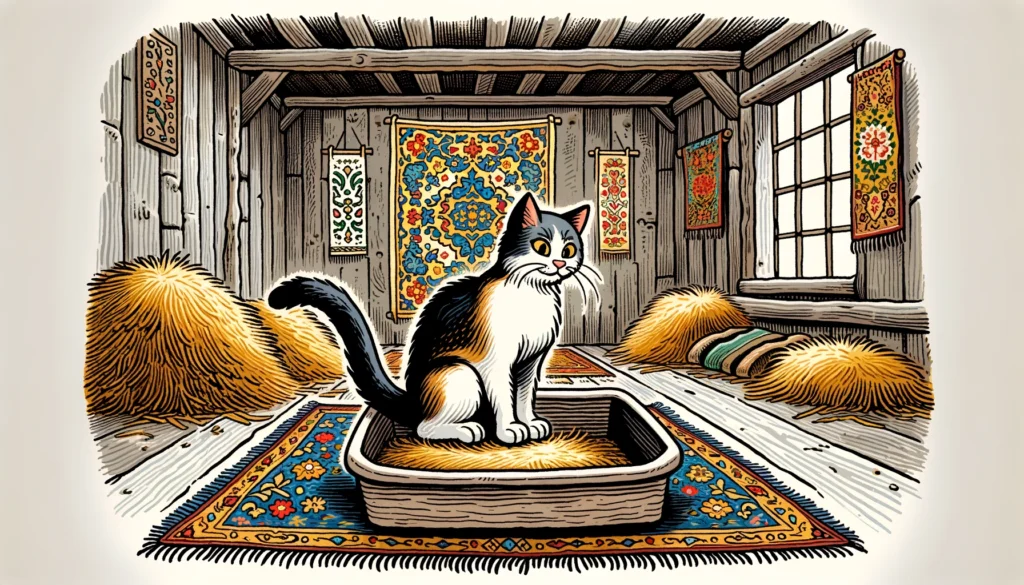When it comes to barn cat care, one common question arises: do barn cats need a litter box? In exploring this topic, it’s crucial to understand the hygiene needs specific to barn cats. Providing a cat litter solution not only promotes cleanliness but also supports their natural behaviors and health.
Here are a few handy tips to get you started:
- Consider the cat’s environment: Barn cats are exposed to different elements than indoor cats, so their needs might differ.
- Observe your cat’s habits: Some barn cats may choose a specific spot to relieve themselves. Noticing these habits can guide your decision on whether to provide a litter box.
- Choose the right type of litter: Barn cats might prefer more natural litter options that mimic their outdoor environment.
By understanding these aspects, you can create a healthier and more comfortable setting for your barn cats.
- Key Takeaways: Ensuring Barn Cat Health with Proper Litter Management
- Understanding Barn Cat Behavior
- The Benefits of Providing a Litter Box for Barn Cats
- Choosing the Right Litter Box and Placement
- Common Questions and Practical Tips
- FAQ About Barn Cats and Litter Boxes
- Further Reading
- Wrapping Up: Litter Boxes and Barn Cat Care
Key Takeaways: Ensuring Barn Cat Health with Proper Litter Management
- Hygiene and Health: Providing a litter box significantly improves sanitation, reducing the spread of diseases among barn cats and maintaining a cleaner barn environment.
- Natural Behaviors: Litter boxes support the instinctual behaviors of barn cats to cover their waste, contributing to their emotional well-being and reducing stress.
- Practical Tips for Litter Management: Effective litter box management includes choosing the right type, regular cleaning, and strategic placement to encourage use and maintain cleanliness.
- Behavioral and Environmental Benefits: Introducing a litter box can help manage territorial behaviors and keep the barn area free of unwanted waste.

You may also like – Decoding Cat Behavior: Litter Box Lounging Explained
Understanding Barn Cat Behavior
To determine whether barn cats require a litter box, understanding their natural habits and environments is essential.
Natural Instincts of Barn Cats
Barn cats, like all felines, have instinctual behaviors that influence their litter habits.
- Territorial marking: They often prefer to mark their territory, which can include using specific spots repeatedly.
- Natural substrates: They are inclined to use soft, diggable materials similar to what they find outdoors.
- Solitary preferences: Privacy matters to them, much like their wild ancestors.
How Barn Cats Adapt to Their Environment
Unlike house cats, barn cats often have more freedom to choose where they eliminate.
- Adaptability: They adapt to various outdoor elements, which can affect their choice of elimination areas.
- Freedom of space: The expansive nature of barns and farms allows them more options to pick a perfect spot.
- Behavioral shifts: Changes in their environment can prompt changes in where and how they choose to do their business.
The Benefits of Providing a Litter Box for Barn Cats
Providing a litter box can offer significant health benefits for barn cats.
Hygiene and Health Considerations
A designated litter area can help manage cat waste and reduce health risks.
- Disease prevention: Limits the spread of parasites and infections among barn cats.
- Cleaner environment: Reduces the accumulation of waste in living areas, promoting a cleaner overall barn environment.
- Easier maintenance: Simplifies cleaning routines and waste disposal for cat caretakers.
Behavioral Advantages
Litter boxes can also help in litter training outdoor cats and maintaining cleanliness in the barn.
- Stress reduction: Provides a consistent and familiar place for cats to eliminate, which can reduce anxiety.
- Territory issues: Minimizes territorial disputes over elimination spots among multiple cats.
- Training ease: Encourages good hygiene habits, making it easier to manage multiple cats in one area.

Choosing the Right Litter Box and Placement
Selecting the appropriate litter box and deciding where to place it are crucial steps in litter box placement for barn cats.
Types of Litter Boxes Suitable for Barn Cats
Explore different kitty litter alternatives for barn cats that can suit the rustic barn environment.
- High-sided boxes: Ideal for cats who like to kick their litter; prevents spillage.
- Covered versus open: Offers choices between privacy and easy access, depending on your cat’s preference.
- Eco-friendly materials: Consider litter boxes made from recycled or natural materials that blend well with the barn aesthetics.
Best Practices for Litter Box Placement
Proper placement can enhance accessibility and encourage use by barn cats.
- Quiet corners: Place the litter box in a low-traffic area where cats feel secure.
- Accessibility: Ensure the box is easily reachable for all cats, including kittens and older cats.
- Protection from elements: If possible, shelter the box to protect it from wind and rain, making it more appealing for regular use.
Common Questions and Practical Tips
Owners often wonder, do farm cats need a litter tray? and seek practical advice.
Practical Advice for Barn Cat Litter Care
Addressing crucial considerations for effective litter management.
- Training barn cats to use a litter box: While some adapt naturally, others may require encouragement and gradual training.
- Selecting the best litter material: Natural, non-clumping materials are ideal as they are similar to what barn cats find outdoors.
- Optimal cleaning frequency: To maintain hygiene, clean the litter box at least once a week, or more frequently depending on usage and the number of cats.
Top Tips for Litter Management in Barns
Effective strategies to manage cat waste efficiently and keep your barn clean.
- Keep a regular cleaning schedule: Regular removal of waste helps prevent odors and maintains a healthy environment.
- Ensure adequate box size: Larger litter boxes provide comfort and ease of use for barn cats, which is crucial in a multi-cat setting.
- Implement multiple boxes: Using several litter boxes can help accommodate the needs of various cats, reducing conflicts and promoting cleanliness.

FAQ About Barn Cats and Litter Boxes
Q: Where do barn cats defecate?
A: Barn cats often find their own spots to eliminate, such as flowerbeds or sandy areas. However, providing a protected litter box can be a considerate option to keep them from using undesirable locations.
Q: How can I prevent my barn cat from escaping?
A: To prevent a barn cat from running away, it’s beneficial to confine them initially, especially if they are young. Ensuring they have company, like another cat, and consistent socialization can also help in making them comfortable in their new environment.
Q: Is a litter box necessary for outdoor cats?
A: Yes, even outdoor cats appreciate a litter box. It helps in maintaining good relations with neighbors by preventing cats from using gardens or yards as a toilet.
Q: Are barn cats beneficial?
A: Absolutely, barn cats are excellent for organic pest control as they naturally reduce mice and rat populations. This is crucial in barn environments to prevent disease transmission to livestock.
Q: How do I keep my barn cat healthy?
A: Keep barn cats healthy by providing them with regular vaccinations, quality food, clean water, and necessary veterinary care. A safe and comfortable shelter is also crucial.
Q: What are some best practices for taking care of barn cats?
A: Best practices include spaying or neutering the cats, providing regular meals, and ensuring they have access to water and shelter. Acclimation to a safe, confined space with a litter box initially can also aid in their adjustment.
Further Reading
Preparing to Receive Your New Barn Cats
Wrapping Up: Litter Boxes and Barn Cat Care
In conclusion, while barn cats may not strictly need a litter box, providing one can greatly benefit their hygiene and your barn’s cleanliness. Here are some key takeaways to remember:
- Hygiene enhancement: A litter box helps keep both the cats and their environment clean and disease-free.
- Behavior support: Using a litter box aligns with the natural instincts of barn cats to cover their waste, promoting a stress-free environment.
- Ease of maintenance: Regularly maintained litter boxes make it easier to manage cleanliness and monitor the health of barn cats.
By incorporating a litter box into your barn setup, you not only improve the living conditions for your feline friends but also ensure a tidier and more orderly barn environment. So, have you considered how a simple litter box could make a big difference in your barn?


